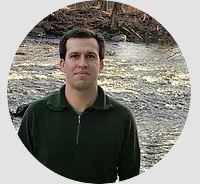
Assessing proposals for complex, former industrial sites
By Alan Hunt, Executive Director
Musconetcong Watershed Association
When confronted with large projects along the Musconetcong River, we usually first learn about it from local residents. This was no different when a 660 MW power plant powered by natural gas and cooled by river water and groundwater was proposed this June. We recently met with members of the Holland Township Environmental Commission and Planning Board to review this project’s proposal, and to discuss some lessons learned from large-scale solar farm project that is nearly finalized with the Planning Board. Planning Boards and Environmental Commissions can have a lot of say in project development at the local level, even on projects with NJDEP permitting.
The Musconetcong Watershed Association may be a bit unusual in New Jersey, as we have a Musconetcong River Management Council composed of appointed municipal officials. Often, these are members of the township committee, planning board, or environmental commission. This River Management Council was formed because the most of the Musconetcong River was designated a National Wild and Scenic River. Because the riverside lands are mostly in private ownership, the National Park Service, our partner in this work, takes a Partnership approach, developing a cooperative agreement with a non-profit to implement a River Management Plan and a River Management Council. All of this means that we do our best to review projects in conjunction with municipal partners, understanding the environmental impacts, the science involved, and the pros and cons of the proposed project.
The challenge for Holland Township comes from a complex of former mills associated with the paper industry. Their owner is involved in remediation and redevelopment. From their view, these sites need a new life and the large, pre-existing footprint can be a valuable resource in the Highlands region. Even with an Environmental Impact Statement ordinance, the Environmental Commissioners found it hard for the township Planning Board to know the right questions to ask of the solar farm applicant. A key turning point for them was learning that the township can have a say in NJDEP permitting – but they only learned this after the fact. but our resources are quite limited.
For the Environmental Commission, and especially the Planning Board, assessing these complex, former industrial sites is a lot more complicated than the typical housing project. As an environmental organization, we are often called in to help. While we can inform and mobilize the public, our resources are quite limited when it comes to reviewing the technical details of project permitting.
We thought creatively about how to address this for the next large project. Could the Planning Board’s legal firm provide an attorney with the appropriate environmental law background during Planning Board hearings with environmental topics? Remember, attorneys are highly specialized, just like doctors: you don’t see your general practitioner for heart surgery. Likewise, the attorney knowledgeable about zoning may not know the ins and outs of environmental permitting. Here are some other lessons learned:
For more information, contact the Musconetcong Watershed Association at www.musconetcong.org/.
By Alan Hunt, Executive Director
Musconetcong Watershed Association
When confronted with large projects along the Musconetcong River, we usually first learn about it from local residents. This was no different when a 660 MW power plant powered by natural gas and cooled by river water and groundwater was proposed this June. We recently met with members of the Holland Township Environmental Commission and Planning Board to review this project’s proposal, and to discuss some lessons learned from large-scale solar farm project that is nearly finalized with the Planning Board. Planning Boards and Environmental Commissions can have a lot of say in project development at the local level, even on projects with NJDEP permitting.
The Musconetcong Watershed Association may be a bit unusual in New Jersey, as we have a Musconetcong River Management Council composed of appointed municipal officials. Often, these are members of the township committee, planning board, or environmental commission. This River Management Council was formed because the most of the Musconetcong River was designated a National Wild and Scenic River. Because the riverside lands are mostly in private ownership, the National Park Service, our partner in this work, takes a Partnership approach, developing a cooperative agreement with a non-profit to implement a River Management Plan and a River Management Council. All of this means that we do our best to review projects in conjunction with municipal partners, understanding the environmental impacts, the science involved, and the pros and cons of the proposed project.
The challenge for Holland Township comes from a complex of former mills associated with the paper industry. Their owner is involved in remediation and redevelopment. From their view, these sites need a new life and the large, pre-existing footprint can be a valuable resource in the Highlands region. Even with an Environmental Impact Statement ordinance, the Environmental Commissioners found it hard for the township Planning Board to know the right questions to ask of the solar farm applicant. A key turning point for them was learning that the township can have a say in NJDEP permitting – but they only learned this after the fact. but our resources are quite limited.
For the Environmental Commission, and especially the Planning Board, assessing these complex, former industrial sites is a lot more complicated than the typical housing project. As an environmental organization, we are often called in to help. While we can inform and mobilize the public, our resources are quite limited when it comes to reviewing the technical details of project permitting.
We thought creatively about how to address this for the next large project. Could the Planning Board’s legal firm provide an attorney with the appropriate environmental law background during Planning Board hearings with environmental topics? Remember, attorneys are highly specialized, just like doctors: you don’t see your general practitioner for heart surgery. Likewise, the attorney knowledgeable about zoning may not know the ins and outs of environmental permitting. Here are some other lessons learned:
- The municipality should articulate its own vision for former or abandoned industrial sites, before they reach the Planning Board. Municipalities can shape future redevelopment uses through Master Planning, zoning, ordinances, and property tax incentives. Otherwise, it is likely the town will get something similar, or possibly worse, than the past site. Get ahead of the game by developing a future vision for your community!
- Planning Board and Environmental Commission members are municipal officials. They are part of the municipal government! This includes greater access to municipal documents and even attorney resources than citizens have. A few hours consulting with an attorney with the right background could prevent a problem down the road.
- The NJDEP and the Highlands Council will meet with municipal officials (and members of the public) and walk through the steps of a permitting process. You can ask them the types of approvals needed for a certain project type, when public hearings can be requested, when public comments can be provided, and how the agency gives public notice.
- Learn more about brownfield redevelopment. Our rural townships may not have as many former industrial sites as urban areas, but our state has a wealth of experts with brownfield redevelopment experience. Ask a brownfield redevelopment specialist to present at an Environmental Commission or Planning Board to showcase the steps that other towns have taken for brownfield redevelopment.
- Learn how to use Open and Public Records Act requests. Don’t sit and ask each other the same questions – get some answers from public documents! ANJEC offers training on this at its Congress each year. Oftentimes, a lot of questions can be answered through a simple records request, especially on former site uses. Information is power, and you will be able to ask better questions of applicants.
- Don’t be afraid to act. Environmental Commissions can send in public comments on a site. In one town I work with, the Environmental Commission Chair used the Commission’s letterhead to provide public comment and request information from NJDEP, which then became part of the site’s permanent record.
- Don’t wait until the last minute. Often, we only hear of projects just before or just after the final site plan review vote. Reach out to experts when a project first gets on the docket. At a final vote or after a vote, very little can be done.
For more information, contact the Musconetcong Watershed Association at www.musconetcong.org/.

